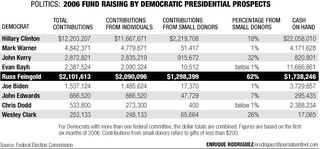A new analysis out today of Russ Feingold's Progressive Patriots Fund--and the leadership PACs of eight other potential 2008 Democratic candidates--shows that Russ is appealing to the same kind of small-dollar donors that a lot of us remember (and a lot of us were) from Howard Dean's quixotic 2004 run. No one else even comes close to the kind of success Russ is having in that regard.
Craig Gilbert's got the story in today's Milwaukee Journal Sentinel:
As he explores a 2008 presidential bid, Sen. Russ Feingold has raised a little more than $2 million this year, putting him ahead of some potential Democratic rivals and well behind others. But in one respect, Feingold's fund raising sets him apart. Unlike any other '08 prospect in his party, his early money is coming mostly from small donors.This graphic has them all; note that only Kerry and Clark have more than 25% of their donations from small donors:
In the first half of 2006, the Wisconsin senator raised 62% of his funds from people giving $200 or less, a much higher share than any other potential candidate. His total of roughly $1.3 million in small donations is topped only by Hillary Clinton, by far the dominant Democratic fund-raiser. [. . .]
Feingold's recent campaign filings offer a glimpse into his likely strategy: to tap the growing, Internet-fueled power of small donors, who propelled Democrat Howard Dean in 2003 and pumped more than $200 million into the last presidential campaign, according to one study of small donors in the 2004 election.
"The strength of (Feingold's) candidacy will depend on his catching a wave powered by Internet donors, much like the Dean wave," said Michael Malbin, a campaign finance expert who helped write that study. "I think it's impressive to have a following of small donors this early," said Malbin, who noted that even Dean began his campaign by raising mostly large contributions, as most presidential hopefuls do early in the election cycle. [. . .]
Spokesman Trevor Miller said more than 25,000 people this year have given to either Feingold's Senate committee or his political action committee, the Progressive Patriots Fund. Miller would not say what share of Feingold's small donations have been made online, which costs a campaign little. In an interview last month, Feingold expressed confidence that if he ran, he'd be able to tap the growing potential of the Internet as a fund-raising tool.
"I think it would explode if we went in that direction," he said. One small example of how that can work occurred in March, when Feingold came out with his well-publicized proposal to censure President Bush over wiretapping. March remains the best month ever for Feingold's political action committee; it took in a little more than $280,000. In only one other month has the committee taken in more than $200,000. [. . .]
A small-donor strategy fits into Feingold's political style (he co-wrote the 2002 campaign finance reforms), and it would also seem to be his best shot politically at building a fund-raising base. He lacks the national networks of big-name Democrats such as Clinton and Kerry and is not the sort of powerhouse fund-raiser among large donors that Warner is turning out to be.

In one sense, I think Feingold's early small-donor strength is incredibly impressive. While it may be true that he's not pulling in Hillary or Warner kind of dough, the small-dollar donors are sustainable--something not true of people who can give $2100 in one shot. If Russ can keep tapping those donors, he'll be able to make up a lot of ground later.
But in a second, larger sense, this also speaks to the broad appeal of Feingold's message; people aren't donating to him because they are big-money folks who want to back a winner, but rather because they are your average joes who like what Russ has been saying and doing. Russ's support for presidential accountabilty and universal health care, among other things, resonates with voters. That's something not all of the people beating Feingold in the money race can say.
Whether or not Russ can win (two divorces, anyone?) is a completely separate question. But right now, it looks like Russ has everything in place that he needs to build a broad movement. I, for one, look forward to watching it take shape.

No comments:
Post a Comment